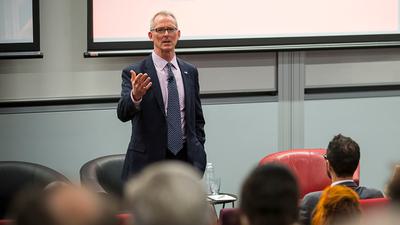As liberal Democrats and conservative Republicans pull farther apart in the long-running, increasingly polarized debate over climate change, Jerry Taylor is a rare bird — an advocate who has switched sides.
For two decades, as an energy and environment expert with the conservative American Legislative Exchange Council and the libertarian Cato Institute, Taylor challenged the scientific consensus on climate change and argued that decarbonizing the energy sector would impose intolerable costs on the U.S. economy. “I was an enthusiastic and convinced champion of the idea that climate change is an overblown problem,” he says.
Today, as the founder and president of the Niskanen Center, a libertarian think tank, Taylor embraces the scientific consensus on climate change and argues that a carbon tax is “the most efficient and least costly means of achieving greenhouse gas emissions reductions and hedging against climate risk.” He makes the conservative case for carbon pricing in footnoted position papers, on Capitol Hill, and to the media, with unbridled passion. “If you believe in free markets, how are those ends advanced by burning the planet?” he asks.
Taylor has joined a small but growing cohort of Republicans, conservatives, and libertarians who are bucking Republican Party orthodoxy on climate — even as President Trump has moved briskly to roll back the Obama administration’s major climate initiatives. Loosely organized and sometimes called the eco-right, they include GOP stalwarts James Baker and George Shultz and the former treasury secretary Hank Paulson; Ted Halstead of the Climate Leadership Council, a newly formed research and advocacy group that supports a revenue-neutral carbon tax; Eli Lehrer of the R Street Institute, a right-leaning Washington think tank that supports carbon taxes; and Lynn Scarlett, a former Bush administration official and director of the libertarian Reason Foundation who now directs global public policy at The Nature Conservancy.
‘You can be a conservative and address climate change in ways that are consistent with our limited government principles.’
These Washington-based groups, with longstanding ties on Capitol Hill, all say there’s no way to enact long-term climate policy in the U.S. without Republicans. They’re playing a long game, laying the ground work for climate action when a window of opportunity presents itself.
“Our focus is on opening up the dialogue,” Scarlett says. “Durable solutions — as opposed to a pendulum swinging from one end to the other — require a comfortable space for business people, Republicans, libertarians, independents, and the moderate middle, as well as Democrats and environmentalists.”
Andrew Moylan says the R Street Institute, where he is executive director, is “in the phase of educating a lot of our conservative brethren. You can be a conservative and address climate change in ways that are consistent with our limited government principles.”
Others are working in states and cities to build a grass-roots conservative climate movement. Backed by a $20 million grant from the MacArthur Foundation, The Nature Conservancy and the Environmental Defense Fund are working to persuade conservative Americans to support clean energy and climate action. Joining them in organizing outside the Beltway are former South Carolina Congressman Bob Inglis of RepublicEN, a membership organization that aims to be a voice for free-enterprise action on climate; the Citizens for Responsible Energy Solutions, which backed moderate Republicans against Tea Party challengers in 2014 and 2016; the rigorously bipartisan Citizens Climate Lobby; and Young Conservatives for Energy Reform, which is led by Michele Combs, whose mother, Roberta Combs, is president of the Christian Coalition. Michigan-based ConservAmerica, formed in 1995 as Republicans for Environmental Protection, also endorses climate-friendly Republican candidates and reminds Republicans that President Reagan once said that preserving the environment is “our great moral responsibility.”
Former Congressman Bob Inglis at a recent talk on why conservatives should support climate action. United States Studies Centre/Flickr
While others seek to influence campaigns, appeal to millennials, or organize business owners, Jerry Taylor operates inside the Beltway. He has prowled the halls of Congress since coming to Washington from his home state of Iowa late in the Reagan administration, and has come to believe that “what drives policy change are the opinions of political elites,” including elected officials, government executives, their staffs, interest groups, and think tanks. The staff at Niskanen, which had a budget of about $2 million last year — Taylor won’t disclose donors — is mostly made up of Washington insiders who publish blogs and position papers, meet with legislators, and participate in conferences.
Taylor’s own conversion began with a cable-TV debate a decade ago with Joe Romm, a fiercely partisan author and climate blogger for the Center for American Progress. In the green room afterward, Romm, who has a PhD in physics, told Taylor that he had misrepresented congressional testimony by noted climate scientist James Hansen. Go look at what Hansen actually said, Romm urged him.
“I went back to my office, looked at the information, and it turned out he was right,” Taylor recalls. “It was from that point on that I decided I had to do more due diligence.”
Taylor started focusing on the economic arguments against climate action until those, too, “began to degrade,” he says. He was as influenced by a widely read paper called “Some Basic Economics of Climate Change” published in 2009 by Harvard economist Martin Weitzman, who argued that what are called the “fat tail risks” of climate change — the non-negligible possibility of “a disastrous collapse of planetary welfare from too much CO2” — should lend an “even greater urgency to reducing [greenhouse gas] emissions by levying a substantial tax on the burning of fossil fuels.”
That same year, Jonathan Adler, a libertarian law professor at Case Western Reserve, called for “a complete rethinking of the conventional conservative and libertarian approach to climate change.” In a paper titled “Taking Property Rights Seriously: The Case of Climate Change,” Adler wrote, “Even if anthropogenic climate change is decidedly less than catastrophic — indeed, even if it is net beneficial to the globe as whole — human-induced climate change is likely to contribute to environmental changes that violate traditional conceptions of property rights.” For example, Adler noted, U.S. emissions could cause harm to poor countries that have not contributed to global warming and so should be entitled to “some form of protection or relief.” That struck a chord with Taylor, who, as a libertarian, believes strongly in property rights.
A meeting with a hedge fund executive named Bob Litterman pushed Taylor past a tipping point. Litterman is a PhD economist and former head of risk management at Goldman Sachs who serves on the board of the World Wildlife Fund (WWF). Like Weitzman, he worries about worst-case scenarios, just as he once did at Goldman, and he believes it is a terrible mistake not to tax fossil fuels to account for the risks associated with greenhouse gas emissions. “This is an insanity that would never be tolerated on Wall Street,” Litterman says.
‘It was made clear to me that there was no space for Cato employees to make pro-carbon tax or climate action arguments.’
At Taylor’s request, Litterman wrote a paper for Regulation, a Cato Institute journal, headlined “What is the Right Price for Carbon Emissions?” Some of Taylor’s colleagues were displeased; Cato’s biggest funders have been the libertarian billionaires Charles and David Koch, who also fund groups promoting fossil fuels and opposing climate action. “It was made clear to me that there was no space for Cato employees to make pro-carbon tax arguments or climate action arguments,” Taylor says.
Taylor left to start the Niskanen Center in 2014, partly over the climate issue, but also to adopt a more pragmatic approach to policy change. That means embracing compromise so long as policy moves in a libertarian direction.
“Passing legislation requires coalitions,” he says. “A meeting of the parties around climate change is conceivable.”
But how? Taylor and his allies on the eco-right lay out several scenarios. A Republican president, although probably not Donald Trump, could invest political capital on behalf of climate action and win a majority of Democrats and some Republicans. Had Senator John McCain, who once sponsored a bill to cap climate emissions, defeated Barack Obama in 2008, the U.S. would likely now have a price on carbon, some conservatives say.
Alternatively, a Democratic president could garner support from his or her own party along with the growing number of Republicans concerned by the threat of global warming. Seventeen House Republicans — led by Ryan Costello of Pennsylvania, Carlos Curbelo of Florida, and Elise Stefanik of New York — recently introduced a non-binding resolution calling for “economically viable” solutions to address climate change.
“There are probably 40 Republican members of the House and maybe 10 Senate members who are to varying degrees uncomfortable with party orthodoxy on climate,” Taylor says. “We’ve moved people from rather unthinking dismissal of carbon pricing to cautious neutrality to entertaining a conversation and exploring the possibilities. When that may bear fruit depends on political circumstances and windows of opportunity that you can’t predict.”
Some conservatives believe an opportunity could arise if Trump and Congress try to reduce or eliminate corporate taxes, as they have promised to do. A policy paper from the R Street Institute says that “a price on carbon just might be the easiest way to finance substantial tax reform.” R Street’s Moylan also notes that if the Trump administration succeeds in eliminating the Clean Power Plan, it could still be required by the courts to regulate carbon emissions, which would open an opportunity to put forth a carbon tax as an alternative.
Some on the ‘eco-right’ are looking beyond Trump, which will give them time to win over more converts.
Another approach could be to use an economy-wide carbon tax, which liberal and conservative economists agree would be a more efficient way to curb emissions, as a way to replace the thicket of top-down environmental regulations and policies, from auto fuel economy standards to tax credits for solar power or electric cars, that are anathema to conservatives. Says Taylor: “How much deregulation can you really get per incremental unit of carbon pricing? That’s worth exploring.”
Some on the eco-right believe that carbon pricing will arrive sooner rather than later. Litterman declares that “absolutely we are going to get it done, and that price is going to be at a higher level than anyone can imagine.” Former Congressman Inglis said recently: “I know [passage of a carbon tax] seems improbable or even impossible. It looks impossible, but I think it’s going to go to the inevitable without ever passing through the probable.”
Others are looking beyond Trump, which will give them time to win over more converts, people like Benjamin Zycher, an energy expert at the conservative American Enterprise Institute. In a recent paper called “The Deeply Flawed Conservative Case for a Carbon Tax,” Zycher argues that any U.S. government action will barely move the needle on global climate emissions and that a carbon tax will inevitably lead to bigger government.
Another holdout? Taylor’s own brother, James Taylor, a senior fellow for environment and energy policy at The Heartland Institute. Heartland takes the position that most scientists don’t believe climate change is primarily man-made and dangerous. About his brother, Jerry Taylor says: “We agree to disagree.”




